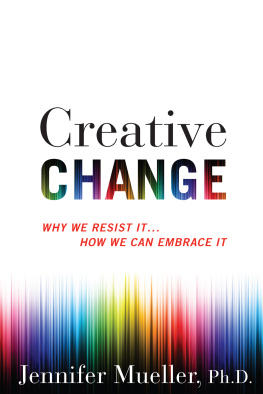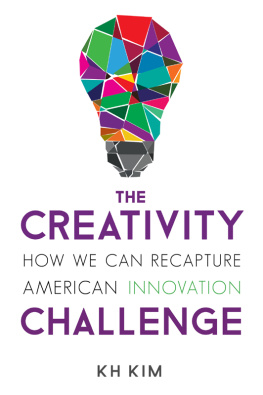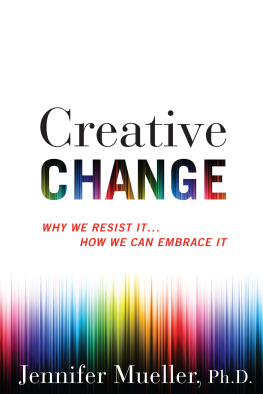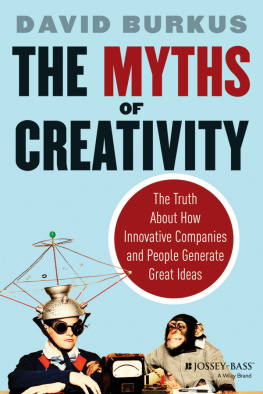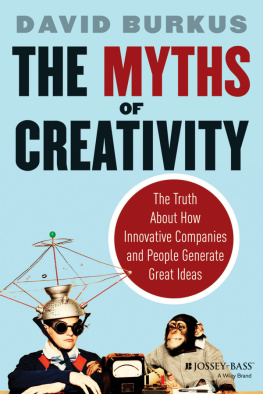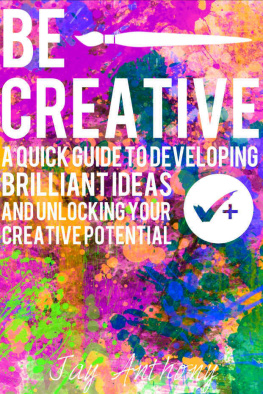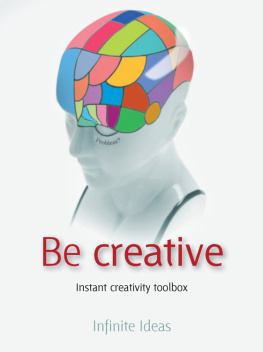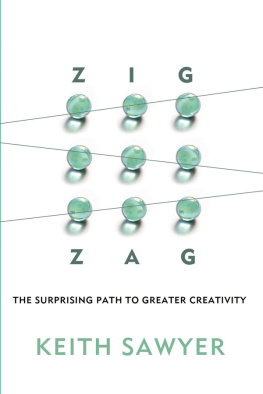Copyright 2017 by Jennifer Mueller
All rights reserved
For information about permission to reproduce selections from this book, write to or to Permissions, Houghton Mifflin Harcourt Publishing Company, 3 Park Avenue, 19th Floor, New York, New York 10016.
www.hmhco.com
The Library of Congress has cataloged the print edition as follows:
Names: Mueller, Jennifer, date, author.
Title: Creative change : why we resist it... how we can embrace it / Jennifer Mueller.
Description: Boston : Houghton Mifflin Harcourt, [2017] | Includes bibliographical references and index.
Identifiers: LCCN 2016036403 | ISBN 9780544703094 (hardcover) | Subjects: LCSH : Creative ability in business. | Creative thinking. | Change (Psychology)
Classification: LCC HD 53 . M 84 2017 | DDC 658.4/094dc23
LC record available at https://lccn.loc.gov/2016036403
Illustration on courtesy of Katharine Mueller
Cover design: Michaela Sullivan
Cover image Getty Images
e ISBN 978-0-544-70313-1
v1.1216
FOR STEVEN
Preface:
The Seeds of Our Uncreative Destruction
In 2016, a group of eminent scientiststhe Science and Security Board of the Bulletin of the Atomic Scientistsincluding several Nobel laureates, rated our current global predicament as being three minutes to midnight. This means that, according to the smartest people on the planet, the human race is about as close to annihilation as we were during the Cold War, a time when a nuclear war with the Soviet Union seemed like a distinct possibility.
To echo scientist and best-selling author Carl Sagan, humans may not survive our technological adolescence. We have serious problems to solve: global warming, terrorism, pollution, nuclear threats, and more... And we need solutions. Tick tock.
How do we find solutions? Creativity.
We believe creativity will save us. Scientists bet on creativity to save our species. And scientists arent the only ones who care about creativity. If you are a businessperson, no matter what company you work for, no matter what your industry might be, you will pray for creativity if your company starts to falter and your job is threatened. If you are an entrepreneur, you pray for creativity every day. If you are in the military, creativity is just about the only thing that will help you win a losing battle. If you are an educator, you hope to teach your students to be more creative so that they can solve the complex problems we face, or at least so they can compete in the world.
I believe this eternal hope for what creativity can do for us is part of the reason behind our fascination with creativity and our endless love of it. Most cultures associate creativity with all things good (e.g., joy, beauty, the divine). So the advice has always been to generate more creative ideas! The more ideas we generate, the better, because the sooner we generate the right idea, the sooner we will be able to solve our most pressing problems. Right?
And we have been following this advice. We have been generating lots of ideas. In fact, we know a lot about how to generate creative ideas. With minimal instruction, any student can generate several good ideas in an hour. With a crowdsourcing website, you could potentially generate thousands of ideas in minutes.
So what is holding us back from a better world? As a species, why are we on the existential brink of annihilation? Why are people and corporations and communities and nations still struggling to be creative?
In the case of companies, you might think that they are not doing enough. True and unique creativity is very rare! So perhaps to find that one creative solution that solves our problems, we need to generate many more. Invest in more inspirational idea-generation programs and brainstorming initiatives for groups. Increase your R&D budget. Empower your employees to generate more ideas faster. Take your people on brainstorming retreats and buy brainstorming software.
For nearly twenty years Ive devoted my professional life to studying creativity. This dialogue around generating more and more-creative solutions is starting to scare me. Thats because my work shows that this dialogue is addressing the wrong problema problem we may no longer have. From where Im sitting, Im not at all convinced that if someone generates the idea that has the potential to save us all, or to save your company, that it will matter for our society, or for your business.
Im writing this book to disrupt the dialogue weve been having around the concept of creativity. We need to change this dialogue, and we need to change it fast. Why, you might ask? What problem are we trying to solve? Both good questions. This book is dedicated to answering them.
Heres the problem in a nutshell: I think we have developed lots of great methods to help us generate new ideas and solutions. The problem is, however, that our ability to recognize and to embrace creative solutions is, to put it mildly, dysfunctional. The sad irony is that we are more likely to reject an idea because it is creative than to embrace it. If our ability to generate creative ideas far outpaces our ability to truly embrace them, then it doesnt matter if you generate a lot of ideas, because they wont make any impact. Great ideas will be left in the file drawer unimplemented. The solutions that can save us wont have a chance to develop and thrive even though someone, somewhere, took the time and effort to generate them.
In short, right now in our timeline, our problem isnt the idea-generation part of creativity. Our problem is our inexplicable inability to get out of our own way, to disrupt our unproductive thinking, and to embrace the new and the bold. You may have heard of creative destruction, a term that economist Joseph Schumpeter coined to describe how new technologies can destroy old markets. Well, Im suggesting that the choice not to embrace creativity will result in another kind of destructionuncreative destructionsticking to the status quo when urgent and pressing problems require that we embrace creativity immediately.
You might say, Yes, yes, yes, we already know this. We already know that people resist change. To which I will counter, Yes, you are right. And if thats true, now do you see the irony around our spending so much time and effort generating the very kinds of ideas we are most likely to reject?
My colleagues and I believe we can explain this curious puzzlewhy we desire creativity so very much, but usually reject it in the end. My goal in the pages that follow is to unveil our best thinking for you about the underlying cause of this hidden barrier.
Heres the good news: We are three whole minutes from midnight, not two and not one. It isnt too late. But it is time to disrupt the dialogue.
Creativity is not magic; I believe we can engineer how we create creativity. And in fact, there are many terrific books and resources to help you generate creative ideas. But this book is not one of them.
Rather, this book contains solutions for how we can embrace creativity, which is a vital process that is, oddly, not often discussed or even acknowledged. I believe that we can engineer our ability to embrace creative change. Once we enhance our tendency to embrace the new, then generating lots of ideas will make sense again, because they will have a fair shot at making impact.
To start, you might ask, arent creative ideas new but also useful? If so, why would people reject them? Chapters describe the scope and scale of the problem.
Specifically, asks a surprising question: we know that people love creativity, but could they also hate it?
chapter identifies how our mindsets can turn our love and hate of creative ideas on and off.
delves into the science behind why we hate creativity and the role our mindsets (and expertise) can play. That chapter raises the possibility that a dislike of creativity is something that people will not easily admit. Instead, it is more like a knee-jerk reaction that may operate beneath our conscious awareness.
Next page
